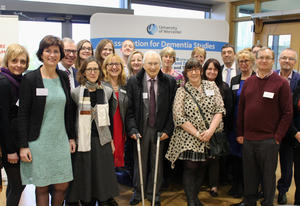Access to local support centres for people living with dementia significantly improves their quality of life and behaviour, new research has found.

A major pilot programme carried out in the UK, Italy and Poland has shown that people experienced improved self-esteem and less disturbed behaviour by attending a regular Meeting Centre, where they could interact with others in a similar situation, close to their home.
Originally developed in the Netherlands, the Meeting Centres help people and their families adjust to living with dementia, by offering exercise, educational sessions, one-to-one meetings with support workers and advisers, as well as therapeutic activities.
In the last two years, two pilot Centres were set up in the UK, in Droitwich, Worcestershire, and Leominster, in Herefordshire, with funding from the Alzheimer's Society and Herefordshire Council, along with Centres in Italy and Poland.
Experts at the University of Worcester's Association for Dementia Studies (ADS) have now completed an evaluation of their effectiveness and found that more than half of Meeting Centre users surveyed noticed an improvement in their self-esteem and more than a third displayed fewer symptoms of disturbed behaviour. Two thirds of family carers reported coping better with their loved ones" symptoms.
One Leominster man, who attends a Meeting Centre, said: "It wouldn't be over-dramatic to say it saved my life. When I was diagnosed, I thought what am I going to do? From the word go, it was just right. People were welcoming, there were projects and things to do. The alternative for me would be to sit at home on my own. It's a no-brainer."
One man attending the Droitwich Meeting Centre said: "When I look around, there are many welcoming faces and they are smiling. I feel we must support one another and try and help each other. We all need a bit of encouragement and we've all got something to offer."
A carer, whose husband lives with dementia, said: "We were at home all the time and I was going under mentally and physically. The Meeting Centre was my saviour. I do have a bit of time to myself now and it is lovely. He's fine when he comes back and it makes me feel so much better."
Now, the Director of the University's Association for Dementia Studies, Professor Dawn Brooker, who led the study, has called for the service to be rolled out across towns in the UK and become part of the standardised care pathway for people with dementia.
She said: "There has been a tendency in the UK to build services at scale that cover ever wider geographical areas or to assume that home-based support with web-based connectivity will provide people with all they need. Meeting Centres are local, friendly and connect people to each other and to their sense of community. Our research shows hard evidence that this brings benefit to people compared to the usual care.
"Support for families and for people affected by dementia is often fragmented and varies tremendously across the country. The Meeting Centres Support Programme can provide integrated, easy access support to people with dementia and their families enabling them to live longer independently with a better quality of life."